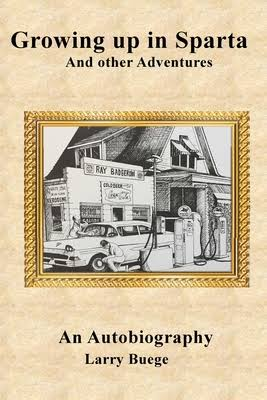Post # 84 July 10, 2023
Quote for the day: "I expect nothing from Michigan, and heartily wish I had never heard of the state." James Fenimore Cooper in a 1848 letter to his wife. The reference is probably to an investment in Kalamazoo real estate that failed to turn a profit.
Reviews
Growing Up in Sparta: And Other Adventures by Larry Buege
This autobiography struck an immediate chord with this reviewer because the author and I were born only three years apart and the account of his childhood reaffirmed my belief that we grew up during a golden age for children. Buege grew up in a small town north of Grand Rapids and a good deal of my childhood was spent in Flint. The author remembers in warm and accurate detail the everyday life of a kid and the culture in which he thrived. Our generation may have been the last of unstructured and simplified childhood. We were not chained for hours to digital games, endless TV shows, cell phones, and near endlessly organized year-round little league sports. We organized our own sports, thought up our own games, and marbles was our only serious addiction.
Buege writes, "My parents raised their children as if we lived in a safe and carefree world." I was given the same liberties. Our parents didn't have to tell us to turn off the TV and go play outside. We ate breakfast and were gone. The author tells us that sociologists have called the kids of the 1950s "free range children" and Buege comments "today free range parenting is almost outlawed." The first half of this book will have WWII baby boomers reconnecting with their childhood.
Unhappily there was a debt due for many of the boys who passed through the golden age of childhood and it was stamped paid in Vietnam. Until the writing of this book the author simply refused to tell anyone of his 11 months spent in Vietnam as a Corpsman. I salute his courage and honesty in sharing his indelible and painful experience with his readers.
His post war years drew him to the U.P. as a teacher and after getting a degree as a physician assistant he spent fifteen very interesting years tending to the inmates at Marquette State Prison. He later worked in a Marquette hospital and somewhere along the way fell victim to the writer's bug. The review copy he sent me was signed and above his autograph he wrote, "We are all making history." This thoughtful, incisive, revealing, and very readable autobiography is proof positive of the handwritten note on the title page. I love history that delves down into the nitty gritty experiences of the common man during any historical era because it proves there are no common men or women only uncommon ones. Bravo Buege!
Growing up in Sparta: And other Adventures by Larry Buege. Gastropod Publishing, 2022, 238p. $16.95 pb.
Indians and Other Misnomers of the Upper Great Lakes: The True Indigenous Origins of Geographic Place Names by Phil Bellfy.
This is really quite a simple but important book that must have taken an enormous amount of work and research to produce. I also personally thought it profoundly ironic for multiple reasons. Basically, as the subtitle states the book simply lists names that were given to places in the Great Lakes area by the indigenous people that are still used today. There is a chapter for each Great Lake state and Ontario listing the indigenous names you will find on maps, highway signs, city limits, lakes and the meaning of each name in it's native tongue. Michigan has nearly a 100 Native American place names. They include Manistee which means Crooked River, Naubinway = Place of Echo, Munising = Island in the Lake, Muskegon = Swampy, Pinconning = Potato Place, and Menominee = Wild Rice People to name a few. It comes as a revelation when one discovers how many Native American words were used or appropriated by Europeans throughout the Great Lakes area in naming geographic features or places.
I can't help but find it ironic that the very people throwing Native Americans off their land would keep the original place names that originated with the indigence people. Or, that Indian Agent Henry Rowe Schoolcraft who signed treaties with various tribes that resulted in the loss of their homeland then named ten new counties in Michigan with "Indian Sounding " names such as Allegan, Oscoda, and Tuscola. Lastly there were the indigenous children who were taken from their homes and sent to schools for the purpose of stripping them of their culture. They were forbidden to speak their native tongue while Europeans thought nothing odd in adopting indigenous words for places Native American children were not allowed to utter.
In addition to the indigenous geographic names found in each of the states and Ontario there is a lengthy alphabetical listing of all the indigenous place names, treaty signers, and untranslatable words used as place names. This is followed by a listing of treaties in the Great Lakes area, the date signed, the location of the signing, and the tribe or tribes involved. Of special note the land involved in each treaty is keyed to the maps preceding the chapters on each state. This is an important and fascinating book that reminds the reader that the culture and language of Native Americans is still with us today. It enriches our language, and the words alone make clear how long this land has been revered and cherished.
Indians and Other Misnomers of the Upper Great Lakes: The True Indigenous Origins of Geographic Place Names by Phil Bellfy. Ziibi Press, 2023, 152p., $25.95 pb.
Shipwrecked and Rescued: Cars and Crew: The City of Bangor by Larry Jorgensen.
This slim book is packed with Great Lakes maritime history and a detailed account in words and photographs of one of Lake Superior's most unusual shipwrecks. The City of Bangor was launched from a West Bay City, Michigan shipyard in 1896 and was built to be a Great Lakes grain hauler. By the 1920s automobile manufactures came to realize that shipping their new cars via Great Lake freighters to dealers on or near Great Lake ports was very cost effective.
The City of Banger was purchased by a transit company and converted to a car hauler by constructing a second lower deck and removing hatches and redesigning the main deck to carry automobiles. Elevators were installed to move the cars between decks. In August of 1925 the City of Bangor set a record for the largest single shipment of automobiles when it docked in Chicago with 500 new cars on board. Less than 18 months later the ship was caught in a late November Lake Superior storm and was tossed on a Keweenaw Peninsula reef like a thrown away toy.
The 29 member crew made it safely ashore then spent 36 hours without shelter on the blizzard swept beach. They nearly froze to death and many suffered severe frostbite before they were discovered by chance when the Eagle River Life Saving Station crew came to the aid of another nearby shipwrecked crew and spotted the City of Bangor crew. The brisk narrative is complimented by numerous photos that tells the extraordinary story of how the crew finally reached Laurium and a badly needed hospital. Then the author tells the equally remarkable story of unloading the cargo from a ship 200 feet off shore and then driving the cars the length of the Keweenaw Peninsula and loading them on trains. All of which was done in a bitterly cold January on a finger of land jutting into Lake Superior on which it's few roads were buried under 30 feet deep snow drifts. It makes for quite a story. The book was was named to the 2023 U.P. Notable Book List.
Shipwrecked and Rescued: Cars and Crew: The City of Bangor by Larry Jorgensen. Fresh Ink Group, 2022, 85p., $20pb.
U.P. Reader: Bringing Upper Michigan Literature to the World Vol. 7. edited by Deborah K. Frontiera and Mikel B. Classen.
I don't envy the hard choices the editors had to make in selecting the poetry, fiction and non fiction included in this annual publication showcasing the best from what I consider the largest (geographically speaking) writers' colony in the country.
Among the cornucopia of fine fiction, non fiction and poetry readers will find a profile of a Calumet hockey player who in 1916 was one of the first American born players to play for the Stanley Cup. He enjoyed a long career in both amateur and profession hockey and later in life became a pairs figure skater. The article also recounts some of the early history of professional hockey in the U. P. Then there is The Karate Club a short story in which seven fresh foods in a refrigerator, led by the Sensei Pickle, practice Karate in order to vanquish spoiled food. One of the virtues I like best in this annual collection is the wide diversity of styles and subjects in both fiction and nonfiction. It is a literary three ring circus. And that includes it's host of poems from haiku celebrating Fiddlehead ferns, to a poem about a dead tree, or Michigamme Grades a poem that embraces the wonder of a place. They all share the magic of poetry represented by this stanza from Michigamme Grades.
"A place where time and essence meet in a dance with the Milky Way and the flapping of a preening loon."
I can't help but comment on my favorite piece. It is an essay by Leigh Mills who cleans year-round and vacation homes in the Les Cheneaux Islands area. She enjoys her work and never tires of it because she takes short breaks or, as she calls them, "little vacations" in a favorite spot in each house where she enjoys, "the peace, quiet, and wonderful views... ." In conclusion she writes, "I focus on experiencing life...every moment is special, not fancy or filled with things...just joy in the smallest way. To be glad we're alive, attuned to the greatness of life and the glory of the Universe is the attitude I carry with me and share with the world."
Does anything else need be said?
U.P. Reader 7th vol. edited by Deborah K. Frontiera and Mikel B. Classen. Modern History Press, 2023, 170p., $19.95pb.
Odin's Eye: A Marquette Time Travel Novel by Tyler R. Tichelaar. Marquette Fiction, 2023, 417p., $28.95.








No comments
Note: Only a member of this blog may post a comment.